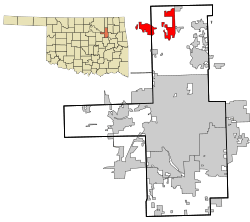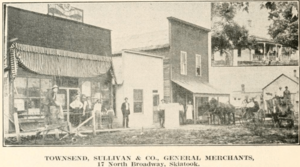Skiatook, Oklahoma facts for kids
Quick facts for kids
Skiatook, Oklahoma
|
|
|---|---|
| Nickname(s):
Gateway to the Osage
|
|
| Motto(s):
"Live Work Play Skiatook"
|
|

Location of within Tulsa County, and the state of Oklahoma
|
|
| Country | United States |
| State | Oklahoma |
| Counties | Osage, Tulsa |
| Area | |
| • Total | 13.86 sq mi (35.89 km2) |
| • Land | 13.71 sq mi (35.52 km2) |
| • Water | 0.14 sq mi (0.37 km2) |
| Elevation | 814 ft (248 m) |
| Population
(2020)
|
|
| • Total | 8,450 |
| • Density | 616.11/sq mi (237.88/km2) |
| Time zone | UTC-6 (Central (CST)) |
| • Summer (DST) | UTC-5 (CDT) |
| ZIP code |
74070
|
| Area code(s) | 539/918 |
| FIPS code | 40-67850 |
| GNIS feature ID | 2413294 |
| Website | www.cityofskiatook.com |
Skiatook (pronounced Skī·ǎ·tōōk or Skī·ǎ·tǒǒk) is a city in the state of Oklahoma, USA. It is located in the northeastern part of the state. Skiatook is about 20 miles (32 km) north and west of the city of Tulsa. Because it sits on the edge of Osage County and Tulsa County, people sometimes call it "the Gateway to the Osage." The city is also where two state highways, Oklahoma State Highway 11 and Oklahoma State Highway 20, meet. In 2020, about 8,450 people lived in Skiatook.
Contents
History of Skiatook
Early Times: The 1800s
A Battle Near Skiatook
Just west of Skiatook, an important event happened during the American Civil War. This was the Battle of Chustenahlah on December 26, 1861. During this battle, soldiers from the Confederate side attacked forces led by Creek Chief Opothleyahola. Chief Opothleyahola and about 1,700 Creek and Seminole people were trying to escape after an earlier defeat. After the battle, many people had to leave their belongings behind as they fled to Kansas. Today, a special marker remembers this battle.
How Skiatook Got Its Name
Skiatook was started in 1872 by William C. Rogers. He was the last leader of the Cherokee people. He set up a trading post in the Cherokee Nation next to Bird Creek. When a post office opened in his store in 1872, the place was named Ski-a-took. The name comes from the Cherokee language. It means "Big-Indian-Me" or refers to something large. Some also say an Osage trader named Skiatooka helped inspire the town's name. In 1892, the name was officially changed to Skiatook.
Growing Up: The 1900s
On December 18, 1904, a bank was built where Skiatook is today. William C. Rogers moved his store and post office closer to the bank. In March 1905, the Midland Valley Railroad was built through the town. This helped Skiatook grow into parts of Osage County and the Osage Nation. The old railroad path is now a 14.5-mile (23.3 km) trail called the Osage Prairie Trail. It connects Skiatook to Tulsa.
Skiatook's first newspaper, the Skiatook Sentinel, started in April 1905. The town officially became a city on May 28, 1905. The first school in Skiatook also opened in 1905.
After Oklahoma became a state in 1907, new roads and bridges were built. The first church building, the First Christian Church, was built in 1907. Between 1909 and 1910, sidewalks were added. In 1912, Skiatook got water, sewer, and electric lights. By 1920, about 2,000 people lived there. A paved road to Tulsa was built in the early 1920s. With good roads in all directions, Skiatook became known as the "Gateway to all points North, South, East and West." In the 1930s, Skiatook started getting water from Lake Spavinaw. The building of Skiatook Lake in 1984 gave the city its own water source.
Modern Times: The 2000s
In the 2000s, Skiatook started a "Main Street program." This program helps make the downtown area a better place to visit and live.
Geography and Nature
Skiatook is in the northeastern part of Oklahoma. It is about 20 miles (32 km) north and west of Tulsa. Because it is on the border of Osage County and Tulsa County, it is called "the Gateway to the Osage." The city is also where Oklahoma State Highway 11 and Oklahoma State Highway 20 meet.
Skiatook Lake
Skiatook Lake is an important part of the area. It was built to help control floods, provide clean water, and offer fun activities. The lake was finished in 1984. It is about 714 feet (218 meters) above sea level. The lake covers about 10,500 acres (42.5 square kilometers) and has 160 miles (257 km) of shoreline. People enjoy fishing, boating, and swimming here.
People of Skiatook
| Historical population | |||
|---|---|---|---|
| Census | Pop. | %± | |
| 1910 | 606 | — | |
| 1920 | 1,653 | 172.8% | |
| 1930 | 1,789 | 8.2% | |
| 1940 | 1,496 | −16.4% | |
| 1950 | 1,734 | 15.9% | |
| 1960 | 2,503 | 44.3% | |
| 1970 | 2,930 | 17.1% | |
| 1980 | 3,596 | 22.7% | |
| 1990 | 4,910 | 36.5% | |
| 2000 | 5,396 | 9.9% | |
| 2010 | 7,397 | 37.1% | |
| 2020 | 8,450 | 14.2% | |
In 2010, there were 7,397 people living in Skiatook. There were 2,796 homes. About 36% of homes had children under 18. About half of the homes had married couples. The average age of people in Skiatook was 32 years old. About 31% of the population was under 18.
Arts and Culture
The Skiatook Museum started in April 1976. In the early 2000s, the museum moved into the old home of Dr. W. G. Phillips. This house was built in 1912 and included his office. The museum shares the history of Skiatook.
Skiatook in Movies
Skiatook has been a filming location for movies!
- Parts of the 1983 movie The Outsiders were filmed around Skiatook. In the movie, this area was called Windrixville.
- Parts of the 2020 movie Minari were also filmed in and near Skiatook.
See also
 In Spanish: Skiatook (Oklahoma) para niños
In Spanish: Skiatook (Oklahoma) para niños
 | Stephanie Wilson |
 | Charles Bolden |
 | Ronald McNair |
 | Frederick D. Gregory |



